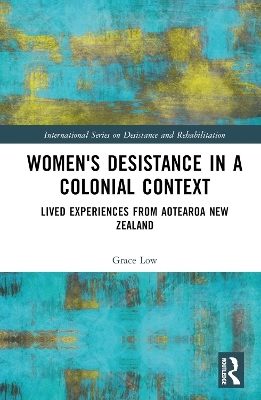
Women's Desistance in a Colonial Context
Lived Experiences from Aotearoa New Zealand
Seiten
2025
Routledge (Verlag)
978-1-032-79936-0 (ISBN)
Routledge (Verlag)
978-1-032-79936-0 (ISBN)
- Noch nicht erschienen (ca. März 2025)
- Versandkostenfrei
- Auch auf Rechnung
- Artikel merken
This book voices the narratives of 15 women (10 of whom identify as Māori) with histories of imprisonment in Aotearoa New Zealand, and makes an original contribution to desistance literature by bringing greater conceptual clarity to gendered aspects of the desistance process and how these manifest in a colonial setting.
This book adds to global knowledge of pathways out of crime (desistance) by exploring the desistance narratives of 15 women with histories of imprisonment in Aotearoa New Zealand (10 of whom identify as Māori, New Zealand’s Indigenous population). By voicing these women’s experiences, the book adds to desistance research by moving beyond the mainstream Western nations which dominate desistance literature (such as the United States and UK), to explore how historical and structural influences – including Aotearoa New Zealand’s colonial history – shape women’s offending and desistance trajectories.
This book explores the women’s journeys in and out of crime, including the various socio-structural constraints which could impede the women’s desistance efforts, especially for Māori women, who are overrepresented in Aotearoa New Zealand’s prison population. This book explores the influence of the women’s personal relationships (with families of origin/whānau, intimate partners, friends/associates, and children) and their institutional interactions (i.e., their experiences of employment, drug/alcohol addiction treatment and other forms of rehabilitative support). The book also takes a close look at the role of housing – and the more subjective notion of ‘home’ – in the women’s offending and desistance journeys. It makes recommendations for policy and practice to support women leaving prison in Aotearoa New Zealand (and internationally) with an emphasis on the importance of wider community support.
This book makes an original contribution to desistance literature by bringing greater conceptual clarity to gendered aspects of the desistance process and how these manifest in a colonial setting. It will appeal to students and scholars of criminology, desistance, gender studies, recovery from addiction, and to practitioners and policy makers in these fields.
This book adds to global knowledge of pathways out of crime (desistance) by exploring the desistance narratives of 15 women with histories of imprisonment in Aotearoa New Zealand (10 of whom identify as Māori, New Zealand’s Indigenous population). By voicing these women’s experiences, the book adds to desistance research by moving beyond the mainstream Western nations which dominate desistance literature (such as the United States and UK), to explore how historical and structural influences – including Aotearoa New Zealand’s colonial history – shape women’s offending and desistance trajectories.
This book explores the women’s journeys in and out of crime, including the various socio-structural constraints which could impede the women’s desistance efforts, especially for Māori women, who are overrepresented in Aotearoa New Zealand’s prison population. This book explores the influence of the women’s personal relationships (with families of origin/whānau, intimate partners, friends/associates, and children) and their institutional interactions (i.e., their experiences of employment, drug/alcohol addiction treatment and other forms of rehabilitative support). The book also takes a close look at the role of housing – and the more subjective notion of ‘home’ – in the women’s offending and desistance journeys. It makes recommendations for policy and practice to support women leaving prison in Aotearoa New Zealand (and internationally) with an emphasis on the importance of wider community support.
This book makes an original contribution to desistance literature by bringing greater conceptual clarity to gendered aspects of the desistance process and how these manifest in a colonial setting. It will appeal to students and scholars of criminology, desistance, gender studies, recovery from addiction, and to practitioners and policy makers in these fields.
Grace Low is a researcher and lecturer at Oxford Brookes University. Her research interests concern women’s desistance from crime, with a focus on their experiences of motherhood, social relationships, and housing or ‘home’. She completed her PhD at the University of Auckland in 2023.
1. Introduction, 2. Gendered Desistance in a Colonial Context, 3. The Study, 4, Families of Origin, Intimate Partners, Friends/Associates, 5. Children and the Salience of Motherhood, 6. Employment, 7. Recovery Programmes, 8. Housing and ‘Home’, 9. Conclusions: Theoretical and Practical Implications for Women’s Desistance
| Erscheint lt. Verlag | 18.3.2025 |
|---|---|
| Reihe/Serie | International Series on Desistance and Rehabilitation |
| Zusatzinfo | 1 Tables, black and white |
| Verlagsort | London |
| Sprache | englisch |
| Maße | 156 x 234 mm |
| Themenwelt | Studium ► Querschnittsbereiche ► Prävention / Gesundheitsförderung |
| Recht / Steuern ► EU / Internationales Recht | |
| Recht / Steuern ► Strafrecht ► Kriminologie | |
| Sozialwissenschaften ► Pädagogik ► Sozialpädagogik | |
| Sozialwissenschaften ► Soziologie ► Gender Studies | |
| ISBN-10 | 1-032-79936-6 / 1032799366 |
| ISBN-13 | 978-1-032-79936-0 / 9781032799360 |
| Zustand | Neuware |
| Informationen gemäß Produktsicherheitsverordnung (GPSR) | |
| Haben Sie eine Frage zum Produkt? |
Mehr entdecken
aus dem Bereich
aus dem Bereich
das Manual zur psychologischen Gesundheitsförderung
Buch | Hardcover (2023)
Springer Berlin (Verlag)
CHF 55,95
Wissenschaftlich basierte Empfehlungen, Tipps und Ernährungspläne für …
Buch (2022)
Thieme (Verlag)
CHF 69,95


